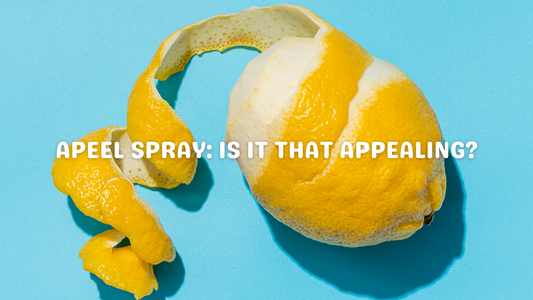If you’re reading this, you probably already know that pesticides can cause harm to our health, and you want to know how to reduce potential harm.
Studies point to at least 13 health risks of pesticide exposure, including:
- ADHD in kids
- fertility issues
- cancers
- respiratory problems
- Alzheimer’s
- Parkinson’s
- birth defects.
Pregnant women and children are especially vulnerable to health risks associated with pesticides. That’s a sobering thought and a good reason to minimise your family’s exposure as much as you can.
Ideally, you would eat spray-free fruit and vegetables all the time. Problem solved.
But what if you live somewhere the availability of spray-free or organic food is an issue? Or you have budget constraints?
That’s when you might start looking for other options. Like whether you can wash pesticides off conventional fruit and vegetables. We get asked about this a lot.
The bottom line? You can reduce pesticide residues by washing fruit and vegetables, but it is impossible to completely eliminate them.
There are thousands of different pesticides used in commercial food production and they don’t all behave the same. An analysis of 33 studies found that washing produce can reduce pesticide residues by 82% at best and it could be as low as 10%.
So yes, it can help. But how much poison is too much for your family?
For our family, knowing that the effects are cumulative, we aim to keep our exposure as close to zero as possible. It’s why we are so determined to support local farmers who don’t use pesticides. We want all families to have access to local, affordable spray-free produce.
Why can’t you wash pesticides off fruit and vegetables completely?
Many fruits and vegetables have multiple pesticide residues, and each pesticide behaves differently. So you might be able to use one method to reduce one of the eight different residues on your strawberries, but the other seven need a different treatment.
That’s if you can even figure out which pesticide or pesticides you’re dealing with.
Some pesticides, called systemic pesticides, are absorbed into the plant so no amount of washing will get rid of them.
It gets more complicated. You not only have to factor in the properties of each individual pesticide but also the characteristics of the produce it’s on. For example, the type of skin on the fruit or vegetable and how permeable it is.
For instance, a study in India found that using one washing technique showed a 77% reduction of a particular pesticide residue in eggplant, but only a 50% reduction of the same pesticide in okra.
And we haven’t even got to the soil yet. Pesticides are sprayed on soil too. Plants draw nutrients from the soil, so residues can make their way into your food that way. Not to mention the disruption to the soil’s microbial balance. The pesticides reduce the beneficial bugs and bacteria that are needed to produce nutrient-dense plants – but that’s a whole other topic!
Washing methods for reducing pesticides on fruit and vegetables
Studies have shown that washing your produce can reduce pesticides on produce. So you can reduce your cumulative pesticide exposure. How much it reduces your exposure can vary a lot and would be tricky to measure.
What do the studies tell us?
- Washing with water works just as well as commercial veggie washes: A University of Maine study found tap water is as effective as other washing solutions for the pesticides they looked at. The study found that it was not the water itself, but more likely the action of rubbing or scrubbing the produce underwater.
- Soaking helps, but only for up to 20 minutes. One study found that pesticide residue removal increased gradually after five minutes up to 20 minutes of soaking. There was no significant difference after that.
- Washing solutions that work… sort of. Some studies explored alternative washing solutions. The ones that performed better were salt water, bicarbonate of soda, vinegar, active oxygen and ozone water. Once again, the type of pesticide residue and the characteristics of the fruits and veggies make a difference to the result.
- Food preparation. We know it’s not a washing technique but still worth mentioning. A meta-analysis study found that the process of preparing food can reduce residues. Not by a lot though. The most effective methods were blanching, boiling, canning, frying, juicing and peeling fruits. BUT dehydration actually increases the concentration of pesticides!
So there you have it. You can remove some of the pesticides from fruits and vegetables. But, no matter how thoroughly you clean or how long you soak, you will not be able to remove 100% of the pesticide residues on your food.
It’s a lot to consider, but we hope that this information helps you find what works best for you and your family right now.




